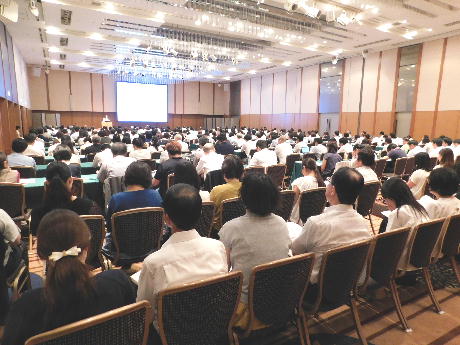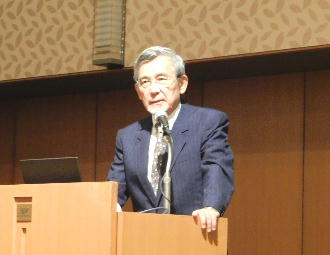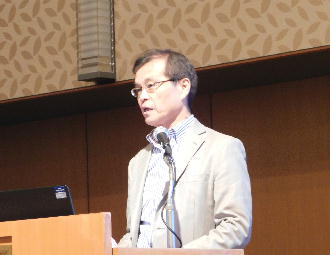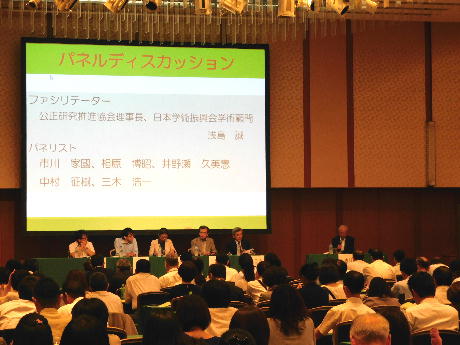Event Reports
Research Integrity Symposium "Research Misconduct - To Prevent It from Happening, If It Happens" (9 Sep '19)
How can research institutions promote research integrity to prevent research misconduct cases? Also, what kind of solutions are required to conduct appropriate investigations into them?
The 3rd Research Integrity Symposium " Research Misconduct - To Prevent It from Happening, If It Happens " was held on 9 September, 2019 in Tokyo by the Japan Society for the Promotion of Science (JSPS) and the Association for the Promotion of Research Integrity (APRIN), and co-organized by the Japan Science and Technology Agency (JST) and the Japan Agency for Medical Research and Development (AMED).
This report introduces several topics from keynote speeches, invited speakers, and panel discussions.

Keynote Speech "Research Ethics Instruction and Investigating Research Misconduct Cases: Desired Internationalization"

In the keynote speech, Prof. Iekuni Ichikawa, Executive Director of APRIN (Research Professor of school of Medicine at Shinshu University and Professor Emeritus of Vanderbilt University) reported on APRIN's activities to promote global research ethics instruction.
To begin, they reported on activities aimed at standardizing the investigation process for research misconduct cases in Japan.
The research misconduct investigation standardization committee held by the APRIN Subcommittee on Medical and Life Sciences (established in July 2017), published a paper titled "Points of Interest and Self-Check Items for Research Misconduct Investigation: Toward the Standardization of Investigation Procedures and Reports after nine meetings and interviews with related ministries and organizations. The research paper was expected to help research institutes conducting research misconduct investigation and contribute to the standardization of research misconduct investigation.
Next, the following two reports were made on teaching materials for research ethics instruction.
The first was a report on materials for Japanese researchers to familiarize themselves with the regulations of submission of international medical journals (especially the code of ethics), and to support them not to suffer disadvantages because of the incompletion of entries at the time of submission.
In recent years, the regulations for the submission of international journals have been significantly updated. In particular, international medical journals have significantly revised their ethical standards to eliminate factors that reduce the reproducibility of their publications from all phases of research planning, implementation, and analysis, which reflect in their submission regulations. Under the Japan Agency for Medical Research and Development (AMED), projects to support the development of models for advanced research integrity conducted by Shinshu University and Osaka City University with Prof. Ichikawa as the principal investigator, the "Ethics Instruction Program on the Reliability of Research Based on International Medical Journals" (commonly known as the "International Journal Project supported by AMED," conducted during the 2016 to 2018 academic year), Educational materials have been prepared and publicly available with the regulations for submission of major international journals have been organized.
The second is a report on ethics learning materials for medical researchers in Japan, especially those who engaged in clinical practice.
With the recognition that researchers should possess ethical standards, medical academic conferences have developed ethical guidelines individually, and provided opportunities for them to learn ethics. However, the problem is that when medical researchers who belong to multiple academic societies learn ethics instruction at each academic society, it will be overlapping and inefficient. Therefore, the Japanese Medical Science Federation has decided to provide a common ethical learning opportunity for the 132 societies (as of November 2019) from the viewpoint of the convenience of researchers. In addition, Prof. Ichikawa of Shinshu University, as a Principal Investigator, Osaka City University, Kyoto Prefectural University of Medicine, APRIN, and other organizations are working together to create teaching materials (commonly known as the Project for the Study of All researchers who support AMED, which has been implemented since the first year of the FY2019 to FY2021).
Prof. Ichikawa expressed his aspirations to contribute to the improvement of the quality of Japanese research through these attempts. Lastly, he called for each researcher not to leave it to the state or the institution to which they belong to, but to take the initiative in conducting research integrity.
Invited Lecture "Background of Research Misconduct Cases and Issues for Promoting Research Integrity"

As an invited lecturer, Prof. Hiroaki Aihara, Vice President of the University of Tokyo, introduced the background of the research misconduct cases based on the investigation conducted by the University of Tokyo, as well as examples of measures currently being aimed to the University of Tokyo.
Prof. Aihara explained that the following factors can be considered as the reasons why research misconduct cases are more likely to occur.- A concept that allows manipulation of charts and data according to hypotheses,
- misdirecting young researchers, such as determining the lack of skills of them are responsible for the failure to achieve the desired results,
- and a closed research environment where lab members cannot consult when they have questions about research integrity.
- Establishment of rules for the storage and sharing of experimental data, etc.
- providing research ethics instruction in line with the careers of researchers and in consideration of student diversity,
- and creating a positive organization that makes it easy for lab members to discuss research.
Lastly, Prof. Aihara stated that he always wanted to be aware that "Research Ethics is for advancing science." He said research ethics is necessary for researchers, and expressed his aspirations to create a mechanism to promote research integrity with a heavy responsibility which universities need to be aware of as an educational institution.
Panel Discussion "Preventive and Reactive Measures for Research Misconduct Cases"

The panel discussion was led by Prof. Kumie Inose (Professor, Faculty of Letters, Konan University), Associate Prof. Masaki Nakamura (Center for Education in Liberal Arts and Sciences, Osaka University), Prof. Koichi Miki (Keio Institute for Global Law and Development, Keio University), Prof. Ichikawa, Prof. Aihara, and Prof. Makoto Asashima; President of APRIN (Professor Emeritus of the University of Tokyo, Research Professor of Teikyo University, and Research Professor of Japan Society for the Promotion of Science).
The discussion proceeded vigorously with a question-and-answer session from the venue, including three topics that were highly requested in the pre-questionnaire survey of the participants of this Symposium.
The first topic was "Effective Research Misconduct Prevention Measures and Recurrence Prevention Measures," and the panelists introduced various preventive measures as follows.
It is necessary to be aware of research integrity in daily research activities to reflect them, and research ethics instruction should use appropriate materials at the appropriate stage according to the experiences of educators. In addition, introducing a mentor system (a mentor system is established separately from the professor and interviewed with students), which allows third parties to intermediate, can change the laboratory's atmosphere in a positive way and lead to the prevention of research misconduct cases, which was one of the questions asked by listeners which related to laboratory management.
The second topic was the "Criteria for Judging Research Misconduct Cases." Prof. Miki and Prof. Aihara mentioned that although it is illegal to alter images, it is difficult to show specific criteria because judgment criteria differ depending on the research field and the scientific community to which the researcher belongs.
The third topic was "What to keep in mind when investigating research misconduct cases." It suggested the importance of formulating procedures that correspond to specific cases to avoid differences in research misconduct, and the contents of investigations between universities and research institutes when research misconduct cases occur.
In addition, there was a call from the venue for administrative staff to prepare research ethics materials, and it was recognized that it is necessary for not only researchers but also all members of universities and research institutes to learn and work on research integrity.
At the end of the Symposium, Prof. Asashima stated that Japanese research will be trusted by the world through efforts towards research integrity, and that the entire university and research institution will work toward research integrity and create an environment where research misconduct cases do not occur.

